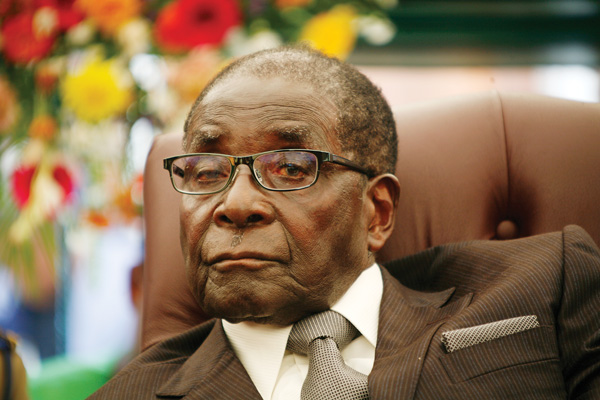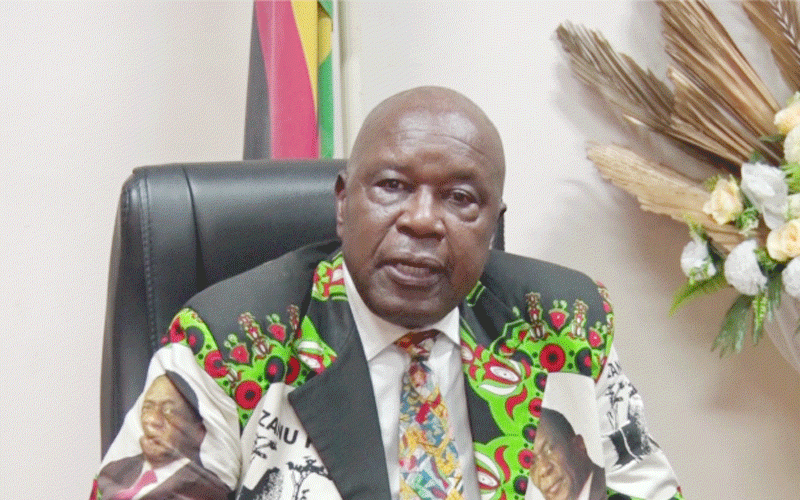
The government gazetted new measures watering down the controversial Indigenisation law on December 24, a development that exposes lack of policy coordination in President Robert Mugabe’s government.
By Everson Mushava
Indigenisation minister Patrick Zhuwao on Christmas day accused Finance minister Patrick Chinamasa of treachery after the Treasury chief announced the changes in Mugabe’s absence.

Zhuwao was supported by Higher and Tertiary Education minister Jonathan Moyo in an argument that captivated Zimbabweans on social media.
Zhuwao is Mugabe’s nephew and he had suggested that Chinamasa was trying to sabotage his uncle who is holidaying in the Far East after the minister announced the changes, a few days after the 91-year-old leader had vowed to tighten the noose on companies that were failing to comply with the law.
However, the gazetting of the new indigenisation regulations turned the tables on Zhuwao as it shows that Mugabe was not only aware of the move, but also approved it.
According to the Government Gazette published on December 24, Framework — Procedures and Guidelines for Implementing the Indigenisation and Economic Empowerment Act (Chapter 14:33) — a cocktail of new measures have been introduced that will include empowerment credits and shareholding rebates to investors, depending on the type of business and level of compliance.
- Chamisa under fire over US$120K donation
- Mavhunga puts DeMbare into Chibuku quarterfinals
- Pension funds bet on Cabora Bassa oilfields
- Councils defy govt fire tender directive
Keep Reading
Compliance, according to the new regulations introduced to improve the country’s ease of doing business, indigenisation is no longer just going to be equity-based, but will also include other factors such as supporting the country’s economic objectives and corporate social responsibility.
Companies will no longer be forced out or nationalised for failing to comply with the indigenisation law, but will be charged a levy for non-compliance.
“Existing foreign-owned companies may continue to operate in all the sectors of the economy, but shall be required to pay an indigenisation compliance levy as trade-off for non-compliance,” section 30 of the gazette reads.
“An indigenisation compliance levy shall be imposed on a sliding scale, rewarding businesses which are compliant whilst penalising non-compliant businesses,” section 31 reads.
Zhuwao has been attacking Chinamasa for trying to dilute the country’s indigenisation laws, going to the extent of accusing him of treachery.
He was adamant the country should maintain the hard-line stance in the country’s controversial indigenisation laws, while Chinamasa was calling for a review of the policy to make it investor-friendly.
The two were meant to address a joint press conference on December 24, but Chinamasa and Reserve Bank governor John Mangudya reportedly stormed out of a pre-conference briefing after sharp differences emerged with Zhuwao over the proposed changes.
It has now emerged that while Zhuwao was attacking Chinamasa, the Finance minister had already pushed his proposals through the normal channels until they were signed into law through the extraordinary Government Gazette.
It would appear Zhuwao was not aware of this development.
Zhuwao was not reachable for a comment yesterday to clarify his misgivings with Chinamasa’s proposals and the public spat given that the issue was already water under the bridge.
According to the gazette, government will now pursue indigenisation through State enterprises and structures and not individuals, a system that had created fertile ground for corruption.
The new regulations also give companies a grace period of up to five years, with a further allowance to apply for more time of up to 20 years after the expiry of the five years.
“The 51% equity held by designated entities in the resource-based sectors of the economy may be diluted to the extent of injection of additional capital by foreign shareholders on a pro rata basis subject to condition that the designated entities shall be entitled to buy new shares in order to restore their shareholding to 51% within a period ranging up to five years, which period may be extended upon application in terms of section 3(a) of the IEE general regulations,” section 21 of the gazette read.
Section 19 reads: “A non-indigenous business may hold the majority shareholding for a period ranging up to five years (except for the energy sector which can go up to 20 years), which period may be extended upon application in terms of section 3 (a) of the IEE Regulations.”
Non-resource sectors include manufacturing, financial services, tourism, construction and energy.
All investment will now be done through Zimbabwe Investment Authority (ZIA) to facilitate the ease of doing business by establishing a one-stop investment centre.
“All companies that have not yet submitted their indigenisation implementation plans as required by the Act should submit their application through ZIA by the new deadline of March 31 2016.”
ZIA will process the applications with consultations with line ministries.
Companies have also been urged to buy locally-produced goods.
However, the new law maintained some of Zhuwao’s hard-line proposals such as imposing a heavy indigenisation levy on companies.









